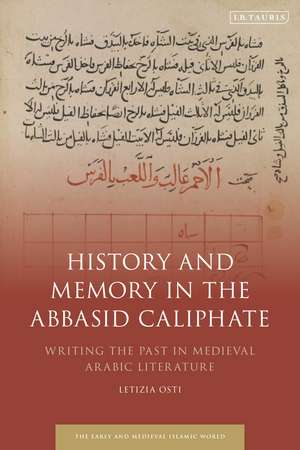History and Memory in the Abbasid Caliphate: Writing the Past in Medieval Arabic Literature: Early and Medieval Islamic World
Autor Prof. Letizia Ostien Limba Engleză Hardback – 15 iun 2022
Preț: 538.77 lei
Preț vechi: 773.09 lei
-30% Nou
Puncte Express: 808
Preț estimativ în valută:
103.13€ • 112.06$ • 86.68£
103.13€ • 112.06$ • 86.68£
Carte tipărită la comandă
Livrare economică 21 aprilie-05 mai
Preluare comenzi: 021 569.72.76
Specificații
ISBN-13: 9781788319232
ISBN-10: 1788319230
Pagini: 200
Dimensiuni: 156 x 234 x 19 mm
Greutate: 0.45 kg
Editura: Bloomsbury Publishing
Colecția I.B.Tauris
Seria Early and Medieval Islamic World
Locul publicării:London, United Kingdom
ISBN-10: 1788319230
Pagini: 200
Dimensiuni: 156 x 234 x 19 mm
Greutate: 0.45 kg
Editura: Bloomsbury Publishing
Colecția I.B.Tauris
Seria Early and Medieval Islamic World
Locul publicării:London, United Kingdom
Caracteristici
The first English-language study on Abu Bakr al-?uli
Notă biografică
Letizia Osti is Associate Professor of Arabic Literature and Language at the University of Milan, Italy. She has been published in journals such as the Journal of Abbasid Studies, the Journal of Arabic and Islamic Studies and Middle Eastern Literatures is the co-author of Crisis and Continuity at the Abbasid Court (2013).
Cuprins
AcknowledgementsTransliteration and TranslationIntroduction 1. Life and Afterlife2. In his own Words3. In his own Time4. In his own Books5. Insight and HindsightConclusionNotes BibliographyIndex
Recenzii
"History and Memory in the Abbasid Caliphate is an innovative contribution compelling the field to think differently about our historical sources. In rehabilitating al-Suli, Osti provides an important guide for how to approach other texts, presenting a rich and rewarding model for interpretation to which readers will want to return again and again."
"Do the formats of early Arabic prose allow us to identify a writer's viewpoint? What is the role of poetry in Arabic historiography? In this detailed but succinct and accessible discussion of how we categorise and evaluate Arabic sources, Letizia Osti makes convincing use of concepts of autobiography and emplotment to explore al-Suli's textual strategies, and reappraises him radically as a historian of his own times."
In this careful study Letizia Osti takes seriously the praise and criticism that her subject, Abu Bakr al-?uli (d. 335/947), has received through the ages, and comes down definitively in his defence. She argues convincingly that he was a thoughtful commentator on his life in the caliphal court and his time in history. Osti goes far beyond a "life-and-times" piece, however. She models how to work with the grain of the written material to craft something that is useful for scholars today. Letizia Osti has written a book that is both useful and a pleasure to read. Senior scholars and graduate students alike will find much here to inform their own research and reflection.
"Do the formats of early Arabic prose allow us to identify a writer's viewpoint? What is the role of poetry in Arabic historiography? In this detailed but succinct and accessible discussion of how we categorise and evaluate Arabic sources, Letizia Osti makes convincing use of concepts of autobiography and emplotment to explore al-Suli's textual strategies, and reappraises him radically as a historian of his own times."
In this careful study Letizia Osti takes seriously the praise and criticism that her subject, Abu Bakr al-?uli (d. 335/947), has received through the ages, and comes down definitively in his defence. She argues convincingly that he was a thoughtful commentator on his life in the caliphal court and his time in history. Osti goes far beyond a "life-and-times" piece, however. She models how to work with the grain of the written material to craft something that is useful for scholars today. Letizia Osti has written a book that is both useful and a pleasure to read. Senior scholars and graduate students alike will find much here to inform their own research and reflection.












